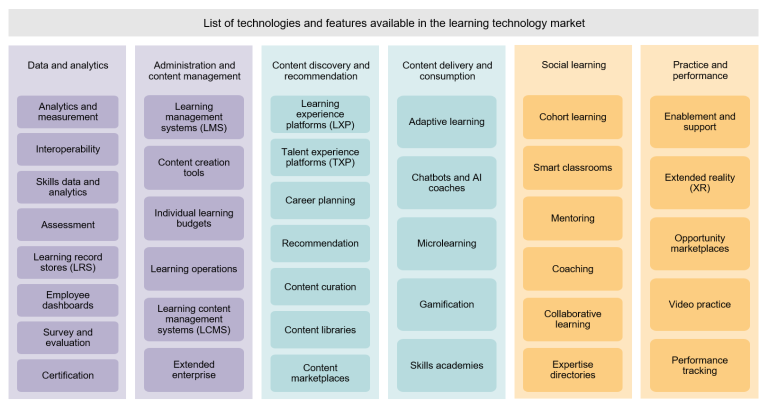By Hannah Power, Bernadette Cording and Krista Hulm - Digital Products and Services, APSC
We recently completed research to inform an ‘APS-wide learning technology roadmap’. The roadmap aims to guide strategic decisions about learning technology. This will better position the APS to use technology to enhance learning, to meet both user and business needs.
We spoke to over 90 APS staff across from various agencies and departments to understand how learning happens in the APS today. We also reviewed online research to understand what makes learning effective and to identify trends in learning technology.
Our research with learners, learning and development staff, supervisors and leaders revealed their needs and experiences learning and supporting learning.
Over the next few months, we will bring together staff from a broad range of agencies and disciplines. We will work together to create and prioritise ideas that can harness opportunity areas identified in the research.
If you would like to get involved and share your ideas to shape the future of learning technology, we would like to hear from you. You can reach out to the team
Key themes from APS learners
- Finding relevant and trusted learning. It takes research and initiative to find trusted, relevant and quality learning. Learners are unsure of what learning is available across the APS and where they can go to find it.
- Flexible learning. Learning needs to be flexible to fit around work schedules and interruptions. Finding time to learn is hard due to work pressures.
- Choice and engagement. Learners prefer different modes and structures of learning delivery, including in-person or online. They enjoy when learning is interactive and when they can choose how they learn.
- Social learning. Learners find value in social learning, both from experts and with peers.
- Online learning. Learners feel frustrated when platforms are difficult to navigate and use. They want opportunities to ask questions.
- Accessible and inclusive learning. Learners with accessibility needs, including the use of assistive technology, cannot access or complete learning that is not designed for them.
- Use of AI when learning. Learners are going outside of government systems to use tools like ChatGPT to support their learning. They need to know how to prompt AI, and how to critique and interpret the responses.
- Applying learning. Learners need safe opportunities to apply and practise their learning to remember it. They seek genuine and respectful feedback to improve.
Key themes from L&D staff and leaders of learning
- Learning technology decision making. Staff feel there is a lack of visibility of what others are doing across government. This reduces the opportunities to learn from others’ experiences.
- Reusing and sharing learning. There's a strong appetite to reuse existing learning.
- High administrative burden of learning systems. Learning system limitations and lack of system integrations result in high administrative burden.
- L&D capability is often outsourced. L&D teams are feeling under-resourced across the APS. Staff shared they are often managing contracts rather than managing internal solutions.
- Dependency on vendors for changes and improvements. Dependency on vendors results in long wait times to fix issues. Platforms may not meet the needs of APS.
- Unused features. Some agencies have access to features through their providers that are not used. Reasons why include lack of staff skills, resources, business need or ICT security barriers.
- Evaluating the impact of learning. Staff feel there is limited time or capability to do evaluation of learning. When feedback is asked for, it may not be received.
Key themes from our literature reviews
Academic literature supported what we heard when speaking to people about their needs. Key findings included:
- the effectiveness of self-directed learning
- the benefits of meaningful social learning experiences
- the importance of active and reflective engagement in the learning process
- and the need to reinforce learning through repeated exposure and practical application.
To understand learning technology trends, we reviewed industry reports and online sources. Top themes included:
- the ongoing expansion, innovation and consolidation in the learning technology market
- the powerful and sophisticated use of AI, automation and data in recent offerings
- the rise of skills frameworks as the organising principle of learning ecosystems
- and an increasing emphasis on flexibility in enterprise architecture solutions.
Our literature review also identified 37 technologies and features offered in the learning technology market which we have grouped into 6 categories.

Image attribution: APS Learning Experience and Technology Discovery Report (APSC, 2024)
Get Involved: Future of APS Learning Technology
Want to have your say on the future of APS-wide Learning Technology? Soon the APSC will be running design jams to help shape the future of learning technology in the APS. These events (both online and in-person) will bring together APS leaders and staff. To register your interest, contact the team.
Explore more




